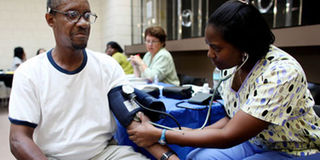How does the heart fail? Who is at risk?

Acute heart failure can be prevented through regular checkups and thus early diagnosis of heart conditions.
What you need to know:
When the heart cannot meet the demands of the body, it may stop almost without warning. Beatrice Nakibuuka explores the causes and possible warning signs of heart failure
Heart failure is a condition where the heart fails to meet the metabolic demands of the body, says Dr Levi Kwarisiima, a cardiologist at Mulago Hospital.
Acute Heart Failure is a sudden onset of the signs of heart failure which occurs abruptly compared with Chronic Heart Failure where the symptoms can be on and off and sometimes can stabilise.
“The sudden onset of the signs and symptoms of heart failure without a timely intervention can cause death,” says Dr Kwarisiima.
Signs and symptoms of Heart Failure include; difficulty in breathing, fast heartbeat (palpitations), swelling of the body beginning with the feet and abdomen, chest pain, dry cough, dizziness and fatigue.
How does the heart fail?
The heart pumps blood to all parts of the body to enable them perform their metabolic activities effectively.
When there is a disorder on the heart, it will be unable to pump blood. This means that the body tissues will not get enough oxygen and nutrients that would come with the blood.
The heart will try to compensate for the nutrients by pumping faster because it will want to supply more oxygen and this causes the fast heartbeat.
Due to the fast heartbeat, the heart is not strong enough to allow blood from the rest of the body to come back to the heart. This in turn causes congestion in the lungs.
Due to the fluid accumulation in the lungs, the patient will have difficulty in breathing.
When the heart is not pumping enough blood to the rest of the body, especially the kidney, they will tend to retain salt and water leading to the swelling of the feet and abdomen.
Causes of Acute Heart Failure
Causes can include;
Massive pulmonary embolism which causes a big clot in the blood vessels to the lungs
Disease affecting the heart valves
Rupture of big vessels of the heart (Aortic dissection)
Air within the space surrounding the lungs (Tension Pneumothorax)
Infections that cause fluid accumulation around the heart (Pericardial effusion).
“Some patients can get the signs while they are awake yet others while they are asleep, says Dr Kwarisiima. When they get them during sleep, it is usually difficult to know that the people got the signs of theattack.”
He adds, “Some people with acute heart failure may present with sudden death and the commonest causes of the death are heart attack, massive pulmonary embolism or abnormal electrical conduction.”
First Aid for heart failure
In case a person gets heart failure, the first aid would be resuscitation by Cardio-Pulmonary Resuscitation.
Cardio-Pulmonary resuscitation (CPR) is a life-saving technique useful when a person gets a heart attack.
Any person nearby can give chest compresses to the patient and this will help them regain the normal electrical conduction in the heart,” says Dr Kwarisiima.
When a person has failed to breathe due to heart failure during air travel, medical personnel will use an automated external defibrillator (AED) to help the heart regain its normal electrical conduction.
The defibrillator is a portable electronic device that automatically diagnoses the life-threatening cardiac arrhythmias of ventricular fibrillation in a patient, and is able to treat them through defibrillation where electrical energy is used to deliver a therapeutic dose to the heart.
who is at risk of sudden heart failure?
People who are at risk of a heart attack include those with hypertension because of the weakened blood vessels, diabetics, smokers and the aging.
When a person has a clot in the arteries supplying blood to the heart muscles (coronary arteries) this can lead to heart attack (myocardial infarction).
The clot is a result of rapture of a plaque, which is an accumulation of bad fats (cholesterol) in the arteries due to diabetes and age.
When a person is stressed, it causes an abrupt rupture of a plaque that forms a clot. The clot in turn forms a block in the blood vessel, stopping the blood supply to the affected heart muscle which may affect the normal electrical conduction in the heart.
Once this happens, the patient will get an abnormal electrical condition in the ventricle (ventricle arrhythmias). The heart is an organ which has an intrinsic mechanism. It initiates its own contraction movements.
When ventricle arrhythmias occurs, the heart cannot contract effectively in order to supply the blood to other body parts where it is needed.
“This will make ineffective contraction of the heart and lead to cardiac arrest. If no timely intervention is made, the patient dies,” says Dr Levi Kwarisiima.
cardiac arrest in sky
Cardiac arrest during commercial flights is a rare event. With the increasing air travel, it is very likely that we will see more fatalities from inflight sudden cardiac death, especially with increasing number of elderly travellers and passengers with various
cardiac comorbidities taking to the skies.
Of the approximately two billion people travelling on commercial airlines annually, it is estimated that about 1000 die from sudden cardiac death.
Sudden cardiac death accounts for 50 per cent of the mortality from cardiovascular damage and is often the initial presenting feature of coronary artery disease.
Collapsed passengers may be mistaken for being asleep, leading to delay in resuscitation attempts, which results in poor survival outcomes.
The restrictive environment of the cabin may also interfere with the management of onboard cardiac arrest, as treatment may be hampered by poor access, restricted space, interference from noise and vibration that makes it difficult to assess pulse and breathing for CPR (resuscitation).
-Singapore Medical Journal, 2011.




